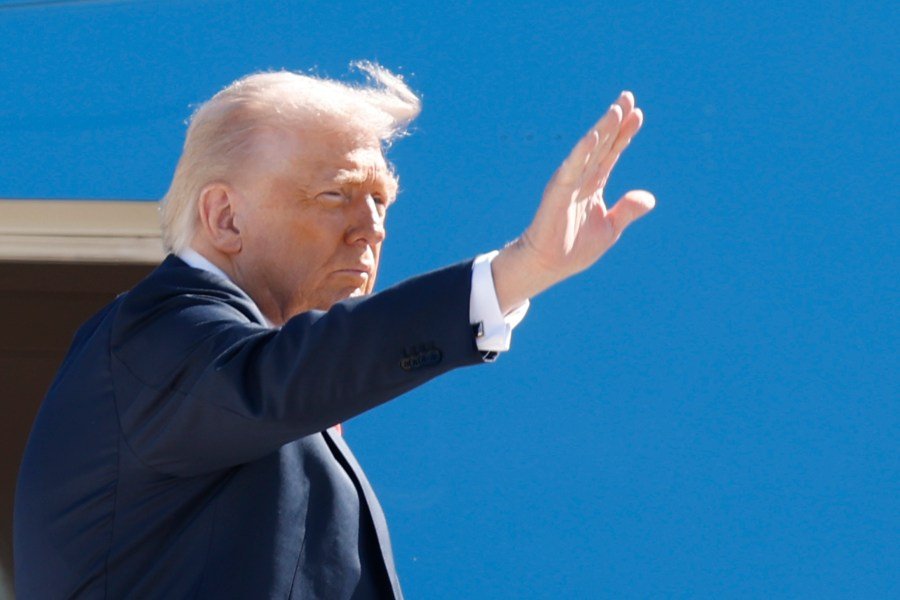
This term, the Supreme Court has several cases on its docket, with several more close behind, dealing with Donald Trump’s executive orders. Forget the unitary executive theory — Trump is pushing for what you might call a “Harry Potter presidency.” That’s where Trump waves his Article Two, says some magic words and gets to do whatever he wants.
He’s already done this repeatedly.
For example, his authority to unilaterally impose tariffs is before the court right now. While the issue in the current term is whether Trump has any authority to impose tariffs at all — the Constitution vests the tariff power with Congress — Trump’s use of magic words isn’t far behind. The statute in question, the International Emergency Economic Powers Act, gives Trump the power to regulate trade only when there is an “unusual and extraordinary threat.” Trump believes that just saying the words, “unusual and extraordinary threat” gives him plenary authority that can’t be questioned by a court.
The technical legal argument he’s making is that he alone has the authority to determine when there is an “unusual and extraordinary threat” and that whether such a threat really exists is a political question that cannot be reviewed by a court.
But Trump’s efforts at constitutional magic are at their peak when it comes to deploying the American military in U.S. cities. Congress has given the president the authority to federalize and deploy the National Guard when one of three things is true: the U.S. has been invaded or is in danger of invasion by a foreign country; there is a rebellion or a danger of rebellion; or things are so bad that the president is unable to enforce the laws of the U.S. using “regular forces.”
In Los Angeles, Portland and Chicago, Trump got sued when he attempted to deploy the Guard over the state governor’s objections. Unable to prove that any of these three things had happened, he fell back on arguing that his claims that there is a rebellion and that federal law can’t be enforced is a political question, and that courts don’t have the authority to question his decision.
While district courts have consistently rejected Trump’s claims, he has fared better (sort of) in the appellate courts, specifically the Ninth Circuit. It, too, rejects Trump’s “political question” claim, but it overturned a preliminary injunction granted in the L.A. case on the grounds that, under an 1827 Supreme Court precedent called Martin v. Mott, Congress granted the president nearly absolute authority to decide when the facts justified deploying the National Guard.
There is no question that these National Guard cases will be decided by the Supreme Court. When they are, here are a couple of things for the good justices to keep in mind.
If you step back a bit, it’s easy to see that Trump’s wider claim that the courts have no authority to second-guess him when he activates emergency powers is constitutional nonsense. Presidents have no constitutional emergency authority. They only have the emergency powers granted to them by Congress. Although Congress can grant emergency powers to the president under certain conditions, a blanket grant of power would be unconstitutional.
In the case of the National Guard, the Constitution gives Congress the power of “calling forth the militia.” Therefore, if Congress did pass a law that allowed the president to deploy the National Guard whenever he felt like it, it would violate the non-delegation principle. So a law giving the president the authority to deploy the Guard under certain conditions must mean exactly what it says, no more and no less. In our constitutional order, it falls to the courts to determine whether those conditions exist and whether the president is complying with the law.
In short, Congress has no constitutional authority to give the president the unreviewable power to send the National Guard into the streets of American cities — and courts have a constitutional duty to ensure that the president colors inside the lines.
This isn’t just a constitutional issue, it’s a practical issue as well. Any presumption that the president is acting either in good faith or even rationally flies in the face of our current reality.
Consider the president’s public musings on Portland. He claims that “Portland is burning to the ground. It’s insurrectionists all over the place. … Turn on your television. Read your newspapers. It’s burning to the ground.” Trump also apparently believes that there are no glass storefronts in Portland. None of this is true.
This isn’t political hyperbole — it’s further evidence of dementia revealing the same disconnect from reality as his claim that his uncle taught the Unabomber. At best, President Trump has confused the Black Lives Matter protests of 2020 with what’s going on in Portland today — which is nothing. Trump is confabulating again, and the court simply cannot ignore that.
In an ideal world filled with virtuous people, perhaps the Supreme Court could hold that courts must accept the president’s factual determinations at face value. But we do not live in an ideal world, and a rule barring courts from evaluating the evidence justifying the president’s assumption of emergency authority is a form of constitutional suicide.
There’s a word for someone who can use magic words to get whatever they want. That word is “king,” and there’s no room for one in our constitutional system of checks and balances.
Judicial restraint is a fine thing. Judicial abdication is not. If President Trump genuinely believes there is an insurrection that requires putting troops on the streets of American cities, he should have no problem proving that to a court’s satisfaction. If he cannot or will not, the courts should send him packing.
Waiving Article Two and shouting “Expecto presidentem!” is no substitute for the rule of law.
Chris Truax is a charter member of the Society for the Rule of Law and an appellate attorney.






